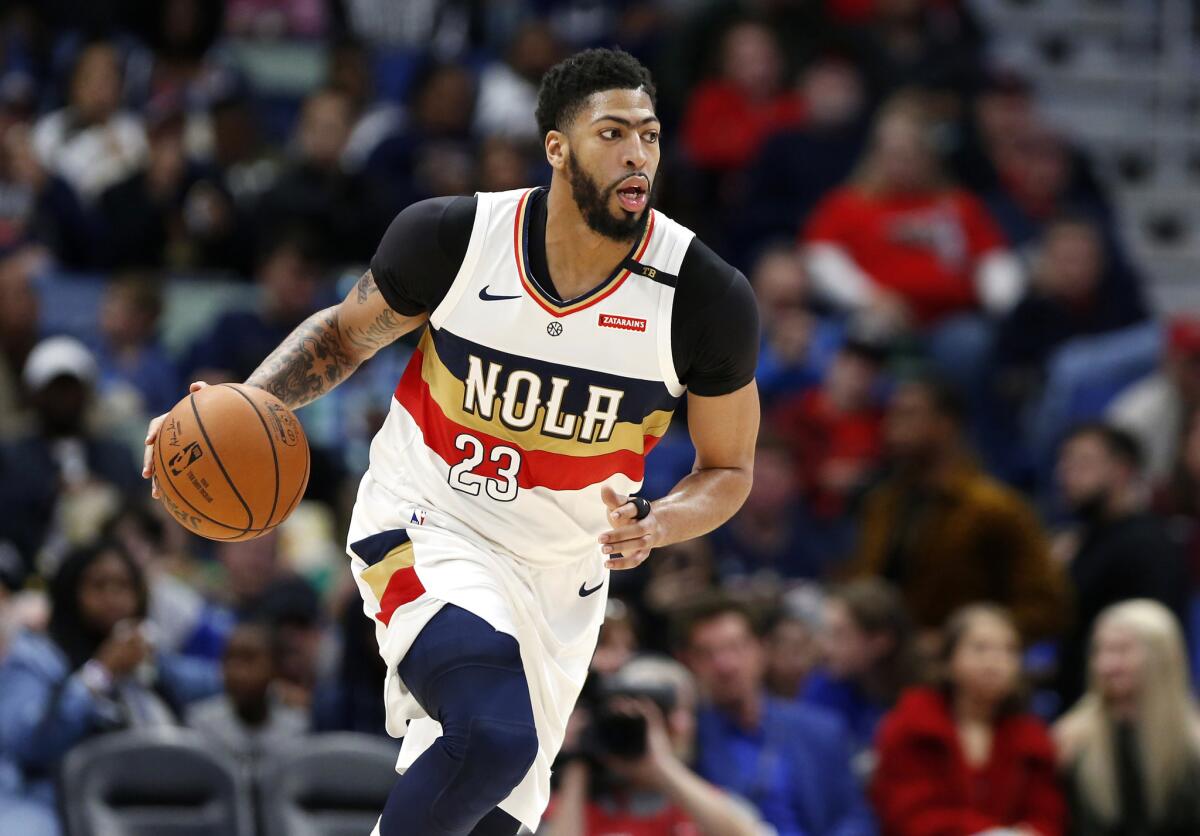Anthony Davis and Patrick Beverley proved their team-first commitments

- Share via
“Money comes and goes; your legacy is forever.”
When Anthony Davis told me that last weekend in his first interview since getting traded to the Lakers, it seemed like the right thing to say at the time. He had recently agreed to waive his $4-million trade bonus so the Lakers could have the maximum cap room needed to pursue Kawhi Leonard. The Lakers’ newest player was showing his commitment to the team and doing his part to help it improve.
Many people joked that Davis really wasn’t sacrificing; that he probably made up the loss with whatever he’s making for his role in “Space Jam 2,” which he’s currently filming alongside new teammate LeBron James. Or that the figure was part of the price he had to pay to coax James into gifting him No. 23, so Davis could continue to wear the number with the Lakers.
Others wondered whether someone who publicly demanded a trade to the Lakers should be compensated for getting his wish? The trade bonus is normally used to appease players dealt to teams they had no say in choosing.
No matter how you want to justify Davis declining $4 million, he proved that playing for the Lakers and building his legacy in Los Angeles means more to him than money.
Forget the trade kicker, which he will easily make up in endorsement deals already coming his way before he even officially becomes a Laker, and look at the contract he left behind in New Orleans.
Davis could have signed the richest deal in NBA history, five years for nearly $240 million. Instead, he wanted to be a Laker so badly that he left behind about $90 million.
“Anthony Davis is not going to be a great basketball player because of the amount of money he makes, it’s going to be about what he achieved on the court and also off the court,” Davis said. “That’s all part of my legacy, and I think that’s way more valuable than any monetary value.”
It’s one thing to say that when you’re leaving $4 million on the table so the Lakers can improve their team. It’s another when you’re turning your back on about $90 million guaranteed.
Davis won’t become a Laker officially until Saturday but he’s already established himself as the most unselfish player on the team.
::
Davis isn’t the only player taking less money to play in Los Angeles. Patrick Beverley said he turned down a three-year, $50-million offer from the Sacramento Kings to take a three-year, $40-million deal with the Clippers.
The new contract allows the Clippers the cap room to pursue Leonard and also bring in forward Maurice Harkless from Portland while adding a future first-round pick in the Jimmy Butler deal with Miami.
It’s normal to be cynical when millionaire players say “it’s not about the money” after joining a team, but Davis and Beverley showed their commitment to winning with the Lakers and Clippers in not only their words but their actions.
“The human part of you wants to take as much money as you see, but all money isn’t good money,” Beverley said. “I did what was best for me and my family, and I did what was best to stay on a winning team.”
::
William Hill opened wagering on the next NBA champion June 14, which was just before Davis was traded to the Lakers. The Lakers at that time carried 10-1 odds. As of Wednesday afternoon, they were 13-10 favorites and getting the bulk of the betting action at more than 100 William Hill Sports Books across the country.
The Lakers are the most popular pick by percentage of total dollars wagered and it’s not close. More than 50% of the money coming in on NBA futures is on the Lakers. The Brooklyn Nets are second at 11%.
::
Every time a “super team” is established in the NBA, the knee-jerk reaction is to scream how it’s unfair and what’s the reason for even watching the league. That was the thought last year when DeMarcus Cousins joined Kevin Durant, Stephen Curry, Klay Thompson and Draymond Green with the Golden State Warriors. They were the first NBA team in more than 40 years to have five players who were All-Stars the previous season. The Warriors, besieged by injuries, lost to the Toronto Raptors in the Finals.
When Dwight Howard and Steve Nash joined Kobe Bryant and Pau Gasol on the Lakers, everyone thought they were a lock to win the championship before injuries and drama almost prevented them from making the playoffs. They eventually got swept in the first round. And when Karl Malone and Gary Payton joined Bryant and Shaquille O’Neal, they were heavy favorites to win the title before the Detroit Pistons beat them in five games in the Finals.
Even when LeBron James teamed up with Dwyane Wade and Chris Bosh in Miami, and Kyrie Irving and Kevin Love in Cleveland, those teams lost in the Finals the first year before returning to win it all the next season.
Super teams might seem unbeatable when they’re assembled, but history shows they’re not.
More to Read
All things Lakers, all the time.
Get all the Lakers news you need in Dan Woike's weekly newsletter.
You may occasionally receive promotional content from the Los Angeles Times.







